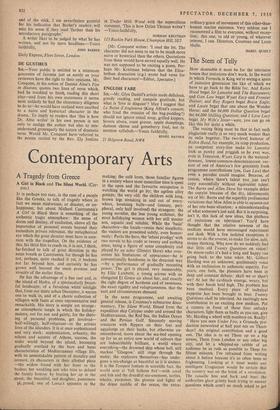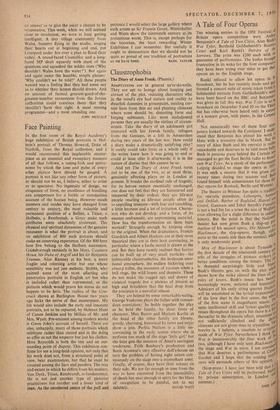The Stem of Telly
How damnable it must be for the television bosses that imitations don't work. In the world in which Formula is King we're seeing,a spate of imitative gcneration the like of which we have to go back to the Bible for. And Robin Hood begat Sir Lancelot and The Buccaneers; and Gun Law begat Wyatt Earp and Frontier Doctor; and Roy Rogers begat Brave Eagle; and Lassie begat that one about the Wonder Horse; and the 64,000 Dollar Question begat the 64,000 Shilling Question; and I Love Lucy begat My Wife's Sister—sure, you can go on like this for quite a while.
The vexing thing must be that in fact each plagiarism really is so very much weaker than its onlie begetter. The two-level humour of Robin Hood, for example, its crisp production, its competent story-line make Sir Lancelot look as pawky and priggish as he ever was, even in Tennyson. Wyatt Earp is the watered- downest, lowest-common-denominatorest ver- sion of one of America's few genuinely fresh programme contributions (yes, Gun Law) that even a parodist could imagine. Because, of course, where there's talent you just can't copy successfully without equivalent talent. The Burns and Allen Show for example defies the copyist because of the dry, idiosyncratic wit of Mr. Burns and the superbly professional variations that Miss Allen is able to squeeze out of her one basic situation: a misunderstanding of what someone's just said. But it is surprising, isn't it, this lack of new ideas, this plethora of imitations on television? You'd have thought that the relative newness of the medium would have encouraged experiment and dash. With a few isolated exceptions it seems to do the reverse, to make for slow, safe, sloppy thinking. Why now do we suddenly find that little old Twenty Questions on vision? On steam-radio it's had a long and happy run going back to the time when Mr. Gilbert Harding was an unknown, gentlemanly voice *ith an inclination to asthmatic asperity. For years, one feels, the planners have been in deep and constant debate: shall we or shan't we? At last the cardinals emerge, weary, but with their heads held high. The problem has been resolved. Every piece of technical expTrtise has been brought to bear. Twenty Questions shall be televised. An excitingly new contribution to an exciting new medium. Put a camera in front of those four unlucky characters, light them as badly as you can, give Mr. Harding a wheel with numbers on. Really! ' Have you seen Under Fire, a Granada pro- duction networked at half past ten on Thurs- days? An original contribution and a good one. The idea is to set Them up on a big screen, Them from London or any other big city, and let a whipped-up rabble of an audience be as rude as possible to Them for fifteen minutes. I've refrained from writing about it before because it's so often been so frightening. Looking at it most weeks any intelligent Uruguayan woulo be certain that the country was on the brink of a revolution. The canaille hiss and bark and boo; the authorities glare grimly back trying to answer questions which aren't so much asked to get
an answer as to give the asker a chance to be vituperative. This week, while we still seemed close to revolution, we were at least getting intelligent. A tiny village community from Wales, banners flying in the studio, singing their hearts out at beginning and end, put Liverpool under fire over a plan to flood their valley. A round-faced Councillor and a long- faced MP dealt squarely with most of the questions and squashed the wilder ones ('Why shouldn't Wales have the water?'). But again and again came the humble, simple phrase: 'Why couldn't ,we be told?' All these people wanted was a feeling that they had some say as to whether their homes should drown. And no amount of factual greatest-good-of-the- greatest-number earnestness from the Jovian authorities could convince them that they shouldn't 'have that right. A most moving programme—and a most revealing one.



































 Previous page
Previous page